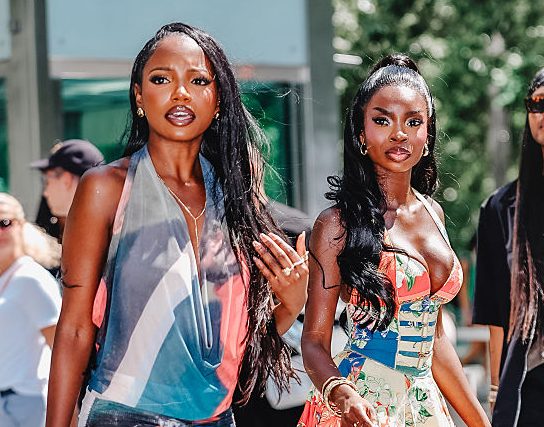Divine Chocolate Touts The Conscientious Business Model
Share the post
Share this link via
Or copy link
by Caletha Crawford
In the U.S., eating chocolate is often referred to as a guilty pleasure. But Divine Chocolate gives confectionery lovers a way to feed their philanthropic tendencies as well as satisfy their sweet tooth. Through a unique farmer-owned and fair trade structure, the company supports and uplifts the cocoa growers who undertake the tedious task of farming and processing the beans that go into each ounce of the various chocolate products. The dividends of ownership not only provide monetary rewards but also a sense of dignity to the collective of workers laboring to get their products to mass market.
It all started with Kuapa Kokoo, a farmer cooperative in Ghana that was formed as a licensed buying company to institute fair pricing and ethical principles for its members. Without a structure like this, West African farmers—who produce 70 percent of the world’s cocoa beans—suffer from poor work environments, unjust price gouging or other exploitative practices. According to the 2002 International Institute of Tropical Agriculture report, 284,000 West African children engage in hazardous tasks on cocoa farms.
For Kuapa Kokoo farmers, however, the chocolate business is a sweeter enterprise. Fair trade—which by definition brings equity to producers in the global market—means the farmers receive just compensation for their crops ($1,600 per ton or the world price, whichever is higher, plus $150 per ton as a fair trade premium). This, in turn, results in higher revenue for Kuapa that then funds improvements to its member communities. For example, building schools has been a focus for the cooperative and a boon to the regions that previously did not have them. In this way, Kuapa is not only able to support this generation but also those to come.
The cooperative further shored up its members’ futures by electing to start its own chocolate brand, which became Divine Chocolate. In 1998, the company launched in the U.K. with funding from The Body Shop, Comic Relief, Christian Aid and the non-profit Twin Trading. Today Divine is a $25 million company in Britain, which pays dividends back to the Kuapa farmer owners. Though not a princely sum, the money earned could be enough to pay for a year of school fees for several children.
But Erin Gorman, CEO of Divine USA, said the intangible benefits of the unique structure are of equal importance. “The farmers in Kuapa have a tremendous sense of pride because they know that they’re not just cocoa farmers, they’re owners of a chocolate company and their voices will be heard,” she said. “If you’re selling to any of another dozen licensed buying companies, they can buy your cocoa or someone else’s. You don’t matter. A farmer once explained to me that that sense of not mattering made them feel like they were ‘tree minders’ and not people.”
Paul Buah, one of Kuapa’s 45,000 farmers and the elected president of the Farmer’s Union, has personally experienced the advantages of being a part of the cooperative. Buah lists access to clean water, additional schools and new mobile health clinics among them but he said owning the company means even more to him. “Apart from the dividend we receive from co-owning Divine Chocolate, it has given cocoa farmers a kind of recognition in the global chocolate industry,” he said.
Stories like these are what gave Divine an entrée into the U.K. market, which is largely controlled by one company. “The British chocolate market is very mature and very consolidated and in Britain chocolate is Cadbury,” Gorman said. “We went into the market with a fantastic story that no one had ever told up to that point about the Ghanaian farmers. And it gave consumers a way of participating in changing the terms of trade by eating chocolate. It was the first time people could be in partnership—and not in a charitable sense—with people in a developing country to create an outcome they [both] valued.”
Divine also gave consumers something else: a way to do good and get a positive experience in return. Before Divine launched, Gorman said fair trade, which was in its infancy in the U.K., was not an attractive option for consumers given the market was limited to only a few low-quality coffee and craft products. At the time, it really took a good Samaritan to choose a fair trade cup of joe over a mainstream brand. Since then, experts agree the fair trade market and recognition there has far outpaced that of the U.S.
Recently, even the big players in the chocolate sector are adopting similar practices. Last year, Cadbury committed to sourcing fair trade beans for the brand’s top selling Dairy Milk chocolate bars. This move alone triples the sales of fair trade cocoa beans from Ghana. Divine takes some personal pride in industry-wide strides like these. “The success of companies like Divine and those that came afterward has really laid the groundwork on the things you see today,” stated Gorman, who also credits campaign and charitable organizations that work to create fair trade.
To further increase demand for fair trade cocoa, Divine launched its line of dark, milk and novelty chocolates into the $16.9 billion U.S. chocolate market in 2006. “The thing that made us optimistic about the U.S. market is that it is so big,” she said. “Even capturing a very small percentage of that would make an enormous difference in the lives of cocoa farmers.” Before the farmers could profit, however, Divine needed to find a way into the market, which is dominated by market leaders like Hershey and Mars.
Prior to the start of the recession in 2008, small, premium and dark segments of the market were fueling the industry’s growth—all good indicators for companies like Divine. Since the economy began to slow, much has been made of the seemingly recession-proof candy sector, but Susan Smith, the senior vice president of strategic communications for the National Confectioners Association (NCA), cautions against overstating the industry’s resistance. “Confections does better than other products during a recession. It’s affordable and it’s a small pleasure, but they are affected like all industries” she said. Accordingly, market research firm Mintel adjusted its growth predictions for the market from 4 percent per year through 2012 to 2 percent. Both Mintel and the NCA agree that even the segment leaders, along with the rest of the market, are slowing as the categories reach saturation and consumers trade down to less expensive treats.
Even in the face of these market pressures, Divine reported 100-percent growth last year. This is partly attributable to Divine’s decision to sink its teeth into the maturing fair trade niche in the U.S. Though the company targeted conventional retail giants like Tesco and Sainsbury in the U.K., Divine decided that given the size and segmentation of the U.S. market, it needed another approach here. “We recognized that we weren’t going to be able to get into a supermarket shelf by going head to head with Hershey” said Smith. “We decided to go after that specialty and natural foods consumer as a way of catapulting us into more mainstream outlets.”
According to the Fair Trade Federation Interim Report, fair trade sales increased by 102 percent in the U.S. and Canada between 2004 and 2007. Though these numbers seem to bode well for brands like Divine, findings from Mintel suggest consumers here have yet to digest what fair trade means. In its March 2010 natural and organic food and beverages study, Mintel found that of the respondents who were interested in natural foods, only 56 percent were interested in fair trade products and approximately a quarter had no opinion one way or the other, leading the firm to conclude “that part of the lack of demand for fair trade products is tied to the fact that many consumers—even those who use natural/organic products—do not know what fair trade is.”
Though she concedes that the fair trade market is relatively small in the U.S., Smith thinks the growth is promising. “Fair trade is not as big yet as it is in Europe, particularly in the U.K.,” she said, adding that the segment has been on her radar. “We’ve seen fair trade products at our [Sweets & Snacks Expo] for the last few years. I think folks are aware of it and some consumers would be interested.” Smith points to the ethical standards of brands like Cadbury’s Green & Blacks organic chocolate and Hershey’s Dagoba as examples of interest in the segment.
Retailers also see increasing potential for the category. “The Food Emporium customer is more aware of what Fair Trade is and what it entails then ever before,” said Steven Kravets, grocery buyer for the Food Emporium supermarket chain. “As we bring in more and more items with the Fair Trade logo and story, it will only strengthen the knowledge.”
Today, Divine Chocolate is sold in natural stores like Whole Foods and Earth Fare as well as regional chains like Wegman’s and Publix and specialty outlets like Borders Books, Nordstrom’s Espresso Bar and movie theaters. Growth plans for the company, which expects to post sales of around $4 million dollars for the 2009-2010 fiscal year, are to saturate the specialty market and spread throughout traditional locations.
As was the case in the U.K., it’s the story behind Divine that has helped set the brand apart. While the ownership model has proven valuable in securing shelf space at the specialty level, it has been vital in tempting conventional grocers. “When you get to that end of the market, you’re having to differentiate yourself in a market where differentiation is usually done by price point,” Gorman said. “So being unique and having a unique story about the farmer ownership has been a major asset.”
Like Kravets, who deems Divine’s chocolates “very good in taste and quality,” Biagio Abbatiello, owner of Biagio Fine Chocolates in Washington, D.C., said the company has all of the characteristics for success in this competitive market. “If a chocolate made from a bean to bar is lacking in complexity, not priced correctly and does not have a great story behind it, it will have a tough time with discerning customers,” he said. “Whenever we feature Divine Chocolate in our tastings, it always shines against some very heavy competition.”
As a small company, Divine relies on personal interactions like these to further its brand message. In lieu of pricey ad campaigns, the brand participates in in-store events and regional fairs. “People have a really irrational attachment in some ways to the chocolate they grew up with. Our task is to say, here’s something else you could try and here’s another reason to try it,” Gorman said. “It gives us an opportunity to tell them the story and that’s much more impactful than advertising at this stage.”
Divine’s target consumers are people who enjoy high-quality chocolate but more specifically, are content consumers. The company and its message tend to resonate most with people who hunger to learn more about the world, are well informed and active in their local communities. “Having tapped into that demographic, the flip side of wanting to know is wanting to share,” said Gorman. “So for everyone that we can get to change their mind, they’ll tell other people. That’s how you really start to go deeper into the population.”
People are not only talking about the brand and its message here in the U.S., the story of Divine and Kuapa Kokoo has garnered attention among fellow farmers in Africa. “Farmers that aren’t a part of Kuapa have started to question other licensed buying companies about why they don’t [operate in the same manner],” said Gorman. “And that’s where change begins to happen in an industry.” Recently Kuapa was able to help a farmer’s organization in Sierra Leone become a top-notch fair trade supplier.
Through Kuapa’s mentoring, those farmers were able to produce their first container of high-quality cocoa. To aid those farmers, Divine purchased that first batch and has plans to continue to source there. “It’s one of my favorite things that Divine has done with Kuapa because it shows the value of farmers owning their own brand,” she said. “They didn’t just lend assistance to these farmers, they provided them a market, which is really invaluable.”
-

Beauty Of 5: Meet Wakati, The Newest Line Catered Specifically To Women With 4C Hair
-

She Tried It: Inahsi Naturals Aloe Hibiscus Leave-In Conditioner & Detangler
-

She Tried It: Ivy Park Drip 2 and 2.2 Black Pack
-

‘Always Work On Your Next Move’—Kandi Burruss Talks Leaving ‘Housewives,’ Broadway Wins, And Her Mogul Mindset
-

8 Famous Lesbian Women Who Were Married To Men
-

HIV Myth-Busters: Debunking The Biggest Misconceptions In Black Communities
-

Falling Behind On Crucial HIV Treatment? Here's How To Get Back On Track
-

Angel Reese 1 Is Here: Inside The WNBA Star’s Debut Sneaker With Reebok





